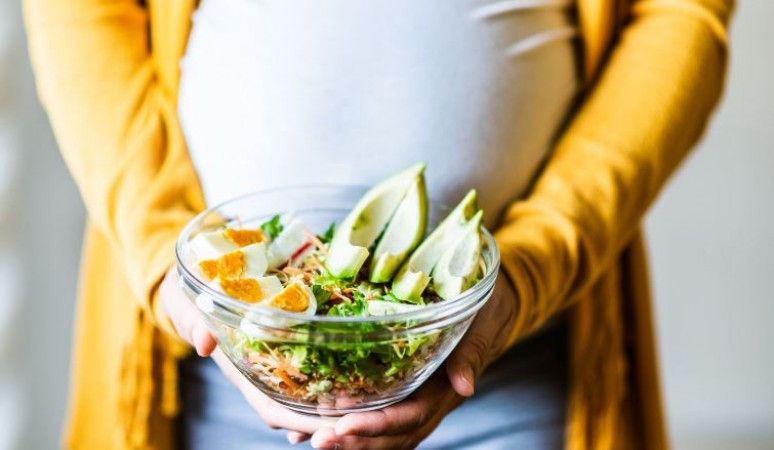
Pregnancy is a remarkable journey that brings about numerous physical and emotional changes in a woman's life. During this crucial period, proper nutrition becomes more important than ever. The foods a mother-to-be consumes not only nourish her own body but also play a pivotal role in the development of her growing baby. While cravings and aversions might become a constant companion during pregnancy, it's vital to make mindful choices that provide essential nutrients. In this article, we delve into the world of pregnancy nutrition, exploring the key foods that offer great benefits during this transformative time.
1. Leafy Greens: A Powerhouse of Nutrients
Leafy greens such as spinach, kale, and Swiss chard are nutritional powerhouses that should find a special place on a pregnant woman's plate. These greens are rich in folate, a B-vitamin that aids in the early neural development of the baby. Additionally, they are excellent sources of iron and calcium, crucial for maintaining the mother's energy levels and bone health, respectively. Including a variety of leafy greens can also help alleviate constipation, a common discomfort during pregnancy.
2. Colorful Berries: Bursting with Antioxidants
Berries like blueberries, strawberries, and raspberries are not only delightful to taste but also packed with antioxidants. These antioxidants combat oxidative stress in the body, which can be particularly beneficial during pregnancy to support the developing baby's cells. Berries are also rich in fiber, aiding digestion and helping to manage blood sugar levels, which tend to fluctuate during pregnancy.
3. Lean Protein Sources: Building Blocks for Growth
Proteins are the building blocks of life, and they play a vital role in the development of the baby's organs, muscles, and tissues. Opting for lean sources of protein such as poultry, fish, eggs, legumes, and tofu can provide the necessary amino acids without excessive saturated fats. Fish like salmon and trout are also great sources of omega-3 fatty acids, which promote the baby's brain and vision development.
4. Whole Grains: Sustained Energy and Fiber
Whole grains like quinoa, brown rice, whole wheat bread, and oats offer sustained energy and are high in fiber. The slow-release carbohydrates in whole grains can help stabilize blood sugar levels and prevent spikes and crashes. Fiber aids in digestion and prevents constipation, a common concern during pregnancy. Additionally, whole grains provide essential nutrients like B-vitamins and minerals that contribute to overall maternal and fetal health.
5. Dairy or Dairy Alternatives: Calcium and Vitamin D
Calcium is a mineral crucial for the development of the baby's bones and teeth. Dairy products like milk, yogurt, and cheese are well-known sources of calcium. For those who are lactose intolerant or prefer plant-based options, fortified dairy alternatives like almond milk, soy milk, and oat milk can also provide calcium. Additionally, many of these products are fortified with vitamin D, which aids in calcium absorption and supports the immune system.
6. Nuts and Seeds: Healthy Fats and Nutrients
Nuts and seeds offer a variety of nutrients and healthy fats that are essential for both the mother and baby. Almonds, walnuts, chia seeds, and flaxseeds are rich in omega-3 fatty acids, which promote brain development and reduce inflammation. These foods also provide protein, fiber, and a range of vitamins and minerals. However, portion control is important, as nuts and seeds are calorie-dense.
7. Legumes: Plant-Based Protein and Fiber
Legumes such as beans, lentils, chickpeas, and peas are excellent sources of plant-based protein, iron, and fiber. Iron is especially crucial during pregnancy as it supports the increased blood volume required to nourish both the mother and the baby. Legumes also provide folic acid, which helps prevent neural tube defects and supports overall fetal growth.
8. Fortified Foods: Additional Nutrients
Pregnancy increases the demand for certain nutrients like folic acid, iron, and vitamin B12. While a balanced diet should ideally cover these needs, taking advantage of fortified foods can be beneficial. Fortified cereals, for example, provide an extra dose of folic acid and other vitamins. However, it's important to read labels and choose options with minimal added sugars and artificial additives.
9. Avocado: Creamy Goodness and Healthy Fats
Avocado is a creamy and delicious fruit that's rich in healthy monounsaturated fats. These fats support the baby's brain development and help absorb fat-soluble vitamins like vitamin E. Avocados also contain potassium, which aids in maintaining proper fluid balance and preventing muscle cramps—a common discomfort during pregnancy.
10. Water: The Ultimate Pregnancy Elixir
While not a food per se, water is perhaps the most essential component of a pregnant woman's diet. Staying hydrated supports the body's increased blood volume, helps prevent constipation, and aids in nutrient transport to the baby. Drinking enough water can also alleviate common pregnancy symptoms like fatigue and swelling.
Pregnancy is a time of immense change and growth, and proper nutrition is the cornerstone of a healthy journey for both the mother and her developing baby. Incorporating a variety of nutrient-rich foods ensures that essential vitamins, minerals, and macronutrients are readily available to support optimal fetal growth and maternal well-being. As always, it's recommended that pregnant women consult their healthcare providers or registered dietitians to personalize their nutrition plan based on individual needs, preferences, and any medical considerations. By making mindful food choices, expectant mothers can nurture their bodies and provide the best possible start for their little ones.
Heart Attack or Panic Attack, Which is More Dangerous?